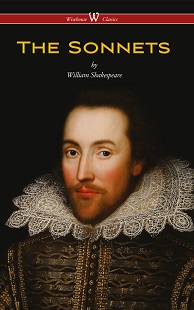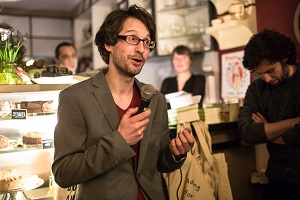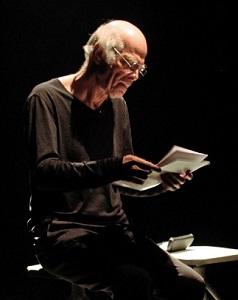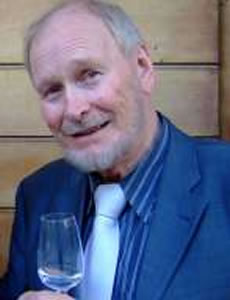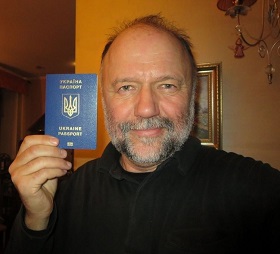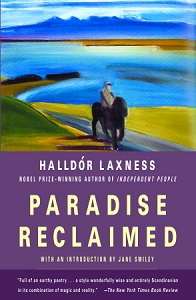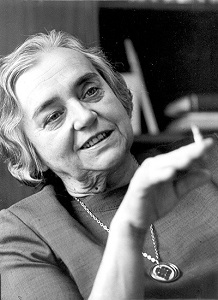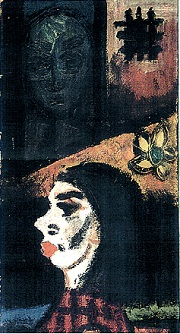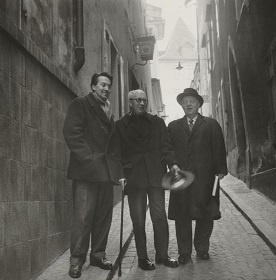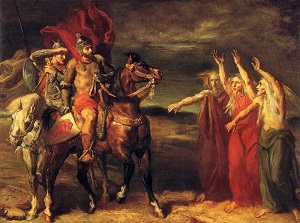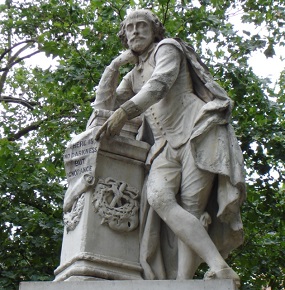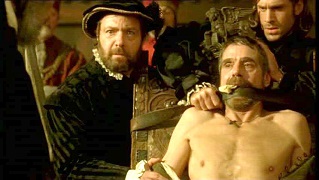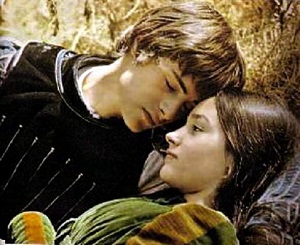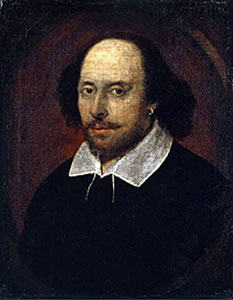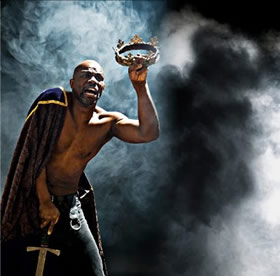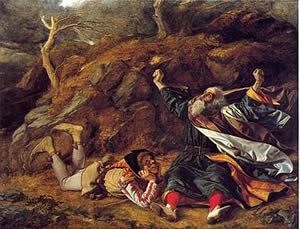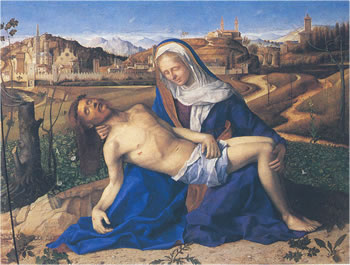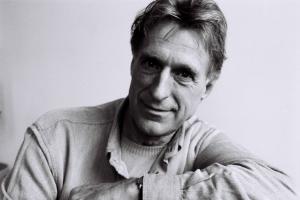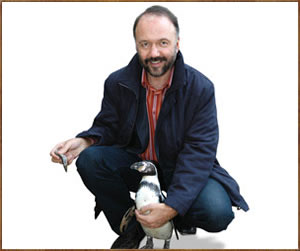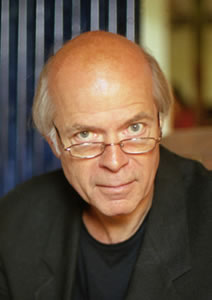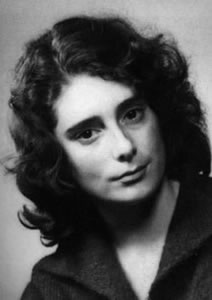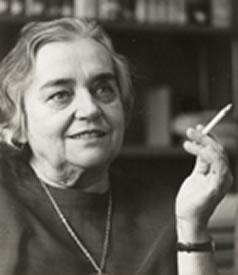De Engelse dichter en schrijver William Shakespeare werd geboren in Stradford-upon-Avon op, vermoedelijk, 23 april 1564. Zie ook alle tags voor William Shakespeare op dit blog.
Uit: Loves Labours Lost
“ACT I
SCENE I. The king of Navarre’s park.
Enter FERDINAND king of Navarre, BIRON, LONGAVILLE and DUMAIN
FERDINAND
Let fame, that all hunt after in their lives,
Live register’d upon our brazen tombs
And then grace us in the disgrace of death;
When, spite of cormorant devouring Time,
The endeavor of this present breath may buy
That honour which shall bate his scythe’s keen edge
And make us heirs of all eternity.
Therefore, brave conquerors,–for so you are,
That war against your own affections
And the huge army of the world’s desires,–
Our late edict shall strongly stand in force:
Navarre shall be the wonder of the world;
Our court shall be a little Academe,
Still and contemplative in living art.
You three, Biron, Dumain, and Longaville,
Have sworn for three years’ term to live with me
My fellow-scholars, and to keep those statutes
That are recorded in this schedule here:
Your oaths are pass’d; and now subscribe your names,
That his own hand may strike his honour down
That violates the smallest branch herein:
If you are arm’d to do as sworn to do,
Subscribe to your deep oaths, and keep it too.
LONGAVILLE
I am resolved; ’tis but a three years’ fast:
The mind shall banquet, though the body pine:
Fat paunches have lean pates, and dainty bits
Make rich the ribs, but bankrupt quite the wits.
DUMAIN
My loving lord, Dumain is mortified:
The grosser manner of these world’s delights
He throws upon the gross world’s baser slaves:
To love, to wealth, to pomp, I pine and die;
With all these living in philosophy.
BIRON
I can but say their protestation over;
So much, dear liege, I have already sworn,
That is, to live and study here three years.
But there are other strict observances;
As, not to see a woman in that term,
Which I hope well is not enrolled there;
And one day in a week to touch no food
And but one meal on every day beside,
The which I hope is not enrolled there;
And then, to sleep but three hours in the night,
And not be seen to wink of all the day–
When I was wont to think no harm all night
And make a dark night too of half the day–
Which I hope well is not enrolled there:
O, these are barren tasks, too hard to keep,
Not to see ladies, study, fast, not sleep!”

William Shakespeare (23 april 1564 – 23 april 1616)
Scene uit een opvoering in The Old Globe in Londen, 2016
De Nederlandse schrijver en journalist Roman Helinski werd geboren in Nuth op 23 april 1983. Zie ook alle tags voor Roman Helinski op dit blog.
Uit: Bloemkool uit Tsjernobyl
“Mijn moeder draaide avonddiensten als verpleegkundige in het bejaardentehuis. Zeven dagen wel, zeven dagen niet. We aten vlak voor ze vertrok rond vijven, om elf uur kwam ze weer thuis. Ons zware, stroeve hek kraakte en piepte dan.
Op de dag van de begrafenis hoorde ik haar ’s avonds haar auto de schuur in rijden. We hadden een heel grote schuur, letterlijk zo groot als een huis. Mijn vader had hem met twee Poolse mannen uit het dorp gebouwd, zonder vergunning en zonder bouwtekeningen. Twee weekenden werden ze hierbij geholpen door een verre oom van mijn vader, ook een Pool. Ze hadden wel wat van elkaar weg. Hij woonde het meest dichtbij van de hele club; met zijn tweede vrouw, een Nederlandse, runde hij een varkenshouderij in Noord-Brabant. De paar keer dat hij langskwam in mijn jeugd nam hij altijd een fles wodka mee. Mijn vader verheugde zich telkens erg op zijn komst.
Aan het eind van elke dag dat gewerkt werd aan de schuur, veegde ik samen met mijn moeder het gruis op dat was achtergebleven. Voor de bouw gebruikten ze grote, grijze stenen, in de nok kwam een wirwar aan balken. ‘Zo blijft de schuur staan,’ zei mijn vader. ‘Zelfs als het stormt.’ Hij zei ook, trots: ‘In Polen bouwen ze de huizen van hetzelfde materiaal.’
Toen het dak er eenmaal op zat, stuurde de gemeente een boze brief, en maandenlang hing ons boven het hoofd dat we de schuur weer af moesten breken. Het waren onzekere tijden, de sfeer thuis was gespannen.
Ruim een uur nadat mijn moeder uit haar werk was gekomen, hoorde ik het hek nog een keer open- en dichtgaan. Vaak wandelde mijn vader ’s avonds door het dorp of hij ging naar de tennisbaan die naast ons huis lag. Soms verdween hij een paar uur zonder te zeggen waarheen. Als mijn moeder vroeg: ‘Waar ben je geweest?’ haalde hij zijn schouders op. Ik was bang dat hij op een keer een hele nacht weg zou blijven, of misschien wel twee nachten. Meestal sliep hij op de bank in de woonkamer wanneer hij tot laat was gaan wandelen. Zo ook deze keer.
De volgende morgen aan het ontbijt zei hij: ‘Ze was zo vreselijk eenzaam vlak voor haar dood. Ik ben bang dat…’
‘Dat jij ook zo eindigt?’ vroeg mijn moeder.
‘Bang dat Babunia zo eindigt.’
‘Maar jij bent er toch?’ vroeg ik. ‘En wij zijn er?’
Mijn vader zweeg een tijdje en keek voor zich uit.”

Roman Helinski (Nuth, 23 april 1983)
De Franse schrijver Pascal Quignard werd geboren op 23 april 1948 in Verneuil-sur-Avre. Zie ook alle tags voor Pascal Quignard op dit blog.
Uit: Dans ce jardin qu’on aimait
« Un pasteur américain, en 1860, a noté les sons que les gouttes de la pluie faisaient retentir sur l’herbe et les petits sentiers de graviers du jardin de la cure. Il transcrit des mois durant, des saisons durant, des années durant, tous les chants des oiseaux qui viennent y nicher, se percher dans les branches, se dissimuler sous les feuilles des arbres. Il s’appelait Simeon Pease Cheney. Le révérend Cheney vivait exactement au temps où le pasteur Brontë finissait ses jours, alors que ses trois filles et son fils étaient morts. Le révérend a écrit dans un de ses plus beaux sermons : « Dieu dit dans Matthieu XIII, 9:
Audiat ! Qu’il entende ! Celui qui a des oreilles, qu’il entende ! Il n’y a pas que les oiseaux qui chantent ! Le seau, où la pluie s’égoutte, qui pleure sous la gouttière de zinc, près de la marche en pierre de la cuisine, est un psaume ! L’arpège en houle, tourbillonnant, du porte-manteau couvert de pèlerines et de chapeaux, l’hiver, quand on laisse un instant la porte d’entrée ouverte dans le corridor de la cure, lui aussi constitue un Te Deum ! » Je vais vous jouer le morceau de musique que fait le vent quand il s’engouffre dans le portemanteau du corridor de la cure.
Alors le récitant obscur se fait sombre interprète : il ouvre le clavier. Apparaît la bande étroite de velours brodée de fils de soie qui le protège. C’est un long ruban somptueux et doux qu’il ôte. Surgissent les touches d’ivoire et leurs lumières, celles d’ébène du vieux piano et leurs reflets. Le révérend enroule lentement autour de sa main gauche la bande de velours brodée. »
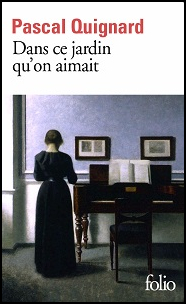
Pascal Quignard (Verneuil-sur-Avre, 23 april 1948)
Cover
De Duitse dichter, essayist en literatuurwetenschapper Peter Horst Neumann werd geboren op 23 april 1936 in Neisse. Zie ook alle tags voor Peter Horst Neumann op dit blog.
Vroege foto van de ouders
Toen was ik
er nog niet,
toen waren ze pas verloofd,
toen hadden ze het nog
kunnen voorkomen.
Hoe graag ik er ben.
De handen, de ogen
Het uur (wanneer
was dat) toen ik begon
met zien, en waren
voordien dan blind
mijn ogen?
Je zei dat twee
niet genoeg zijn
een derde zou nodig zijn
een oog achter de ogen,
maar van jezelf
moest het wel zijn.
Maar de hand, de derde,
die van een ander is,
die ik met beide handen
vastgreep, om de waargenomen wereld
te begrijpen.
Vertaald door Frans Roumen
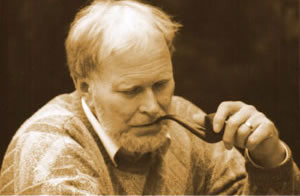
Peter Horst Neumann (23 april 1936 – 27 juli 2009)
De Oekraïense schrijver Andrey Kurkov werd geboren op 23 april 1961 in Leningrad. Zie ook alle tags voor Andrey Kurkov op dit blog.
Uit: The Gardener from Ochakov (Vertaald door Amanda Love Darragh)
`Ma, your friend’s at the gate, and she’s got another dodgy man with her!’ Igor shouted cheerfully. `Keep your voice down, will you?’ said his mother, coming out into the hallway. ‘She’ll hear you!’ Elena Andreevna shook her head as she looked reproachfully at her thirty-year-old son, who had never learned to lower his voice when necessary. It was true that their next-door neighbour, Olga, did seem to be taking rather too much of an interest in her personal life. As soon as Elena Andreevna and her son had moved from Kiev to Irpen, Olga — who was also fifty-five years old and single —had taken her under her wing. Elena Andreevna had divorced her husband before she’d retired, largely because he had started to remind her of a piece of furniture, being inert, silent, perpetually morose and apparently incapable of helping out around the house. Olga had been smart enough not to get married in the first place, but she spoke about it casually, without regret. ‘I don’t need to keep a husband on a leash,’ she had once said. ‘Put them on a leash and they start to behave like dogs, always barking and biting!’ Elena Andreevna went out to the gate and saw her neighbour. Next to her stood a wiry, clean-shaven man of around sixty-five with an expressive face and a determined chin, closely cropped grey hair and a faded canvas rucksack on his back. tenochka, I’ve brought someone to meet you! This is Stepan. He fixed my cowshed.’ Elena Andreevna looked sceptically at Stepan. She didn’t have a cowshed, and nothing else needed fixing. Everything was in perfect working order, for the time being, and she wasn’t in the habit of inviting unfamiliar men into the house for no reason. Although the look of amused indifference in Elena Andreevna’s eyes had not escaped his attention, Stepan politely inclined his head. `Do you by any chance need a gardener?’ he wheezed, his voice full of hope. Stepan was dressed smartly in black trousers, heavy boots and a striped sailor’s undershirt. `People usually hire gardeners at the beginning of spring,’ remarked Elena Andreevna, unable to hide her surprise. `I prefer to start now and finish in late winter. I can prune the trees and tidy everything up, and then I’ll be on my way. Trees need looking after all year round. My rates are quite reasonable, too — I’ll be happy with a hundred hryvnas a month, plus board and lodging. Mind you, I’m quite fond of cooking myself.”
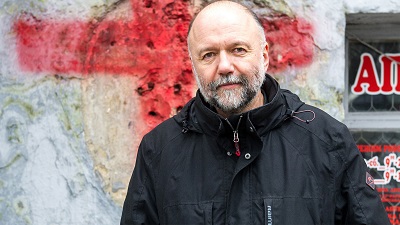
De IJslandse schrijver Halldór Laxness (eig. Halldór Guðjónsson) werd geboren in Reykjavik op 23 april 1902. Zie ook alle tags voor Halldór Laxness op dit blog.
Uit: Iceland’s Bell (Vertaald door Philipp Roughton)
“No one owns anything unless he has letters for it,” said the king’s hangman.
“I believe that it says in the old books,” said the old man, “that when the Norwegians arrived in this empty land, they found this bell in a cave by the sea, along with a cross that’s now lost.”
“My letter is from the king, I say!” said the hangman. “And get yourself on up to the roof, Jón Hreggvibsson, you black thief!”
“The bell may not be broken,” said the old man, who had stood up. “It may not be taken away in the Hólmship. It has been rung at the Aljingi by Öxará since the beginning-long before the days of the king; some say before the days of the pope.”
“I could care less,” said the king’s hangman. “Copenhagen must be rebuilt. We’ve been fighting a war against the Swedes and those filthy bastard skulkers have bombarded the place.”
“My grandfather lived at Fíflavellir,* some way up from here on Bláskógaheibi,” said the old man, as if he were starting to narrate a long story. But he got no further.
“Ne’er would king with arms so stout caress her
Drape her in gems that fair bewitch
Drape her in gems that fair bewitch . . .”
The black thief Jón Hreggvibsson was straddling the roof, his feet dangling out over the gable, singing the Elder Ballad of Pontus.* The bell was fastened with a thick rope around the ridgepole, and he hacked at the rope with an ax until the bell fell down into the dooryard:
“Drape her in gems that fair bewitch
-Unless she were both young and r-i-i-i-ch . . .
. . . and now they say that my Most Gracious Hereditary Sire has gotten himself a third mistress,” he shouted down from the roof, as if announcing tidings to the old man. He looked at the edge of the ax and added: “And she’s supposed to be the fattest of them all. That’s what separates the king from me and Siggi Snorrason.”
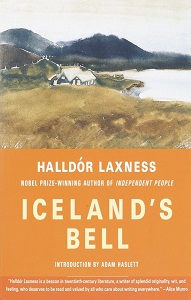
Halldór Laxness (23 april 1902 – 8 februari 1998)
Cover
De Oostenrijkse dichteres Christine Busta werd geboren op 23 april 1915 in Wenen. Zie ook alle tags voor Christine Busta op dit blog.
Das Wunder
Auf getan hat die blinde Kastanie,
die du als Weggeleit mir pflücktest,
über Nacht ihre Stachelwimpern.
Aus dem Verdorren der grünen Lider
trifft mich stündlich größer der reine
braune Blick deiner herbstlichen Seele.
Nah blieb der Engel wie einst dem Tobias.
Von der Freude
Im Gestrüpp der Verzweiflung
die Freude aufspüren,
aber nicht jagen!
Ihre Laufkraft erkennen,
ihr Innehalten,
den möglichen Haken der Umkehr
erwarten.
Auch ihr Entschwinden wird Zulauf,
nur in eine andere Richtung.
Zu wissen, daß es sie immer noch gibt,
ist Teilhabe in Geduld.
Unzähmbar von den Händen des Fängen
sonnt sie sich in den Augen des Spähers,
bleibt unterm Wimpernschatten ihm ruhn.
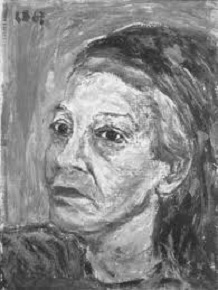
Christine Busta (23 april 1915 – 3 december 1987)
Portret door Paula Ludwig
De Duitse dichter, schrijver, essayist en psychoanaliticus Richard Huelsenbeck (Hülsenbeck) werd geboren op 23 april 1892 in Frankenau. Zie ook alle tags voor Richard Huelsenbeck op dit blog.
Mit güldenen und roten Segeln
Mit güldenen und roten Segeln
fuhr ich hinauf Central Park West zu den
wirren Vierteln, wo die Portorikaner mit Huhn
und Hund, zwischen Decken und Diesteln der
alten Heimat geruhsam Bildnis zurückschrein.
Im Traum und auf den Straßen, eingewickelt in
des Golfstroms nördlichen Dunst und Schein,
mit schweißigen Händen und Haupt –
oh Heimat im Busen des Südens und der Windsbraut,
so gedenken wir dein.
Warum fütternde Brüste gabt ihr nicht
Milch genug, die Zukunft zu düngen?
Und warum wurde das Gold des Abendlichts
Kupfer nicht im Hosenbund und Brot
zu brechen für Hunger und Hund…?
Ach, so fuhr ich mit roten Segeln hinauf
Central Park West, auf dem Zement und ge-
wiegt von des Benzins häutigem Schal.
und die Menschen des Alltags begrüßten
mich und die Wehmut des Wassers
um mich herum und sie winkten der Schön-
heit, die ihre Brust nicht gekannt,
und die Gesichter der Frauen in
starrem Hinblick, Musen der Stunde,
sagten sie Ja zu meinem Beginn.
Hier bin ich, Schiffer der Städte,
dem Mastbaum verbunden, den Falter
der Sehnsucht im offenen Knopfloch,
vorwärts stotternder Kämpfer und Künder
des Hafens, der sich verschließt.
Acht Glas schlägt, und wir sitzen bei
Tisch. Wo ist die Bibel und wo ist der Sinn?
Haben wir nicht Meile um Meile der Hai-
fische Gier betrogen und sind wir nicht,
Voraneiler der Wellen, dem Himmel vereint?
Ach, wir wiegen dich auf den Händen, Jahr-
hundert des Sinns, der Qual und der Schön-
heit der Weiber, die uns bedrängt.
Atemumflossenes Bild der Befreiung –
wir sind dir verhängt.
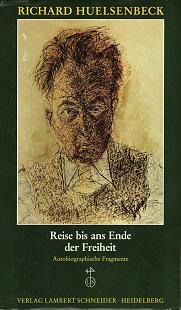
Richard Huelsenbeck (23 april 1892 – 20 april 1974)
Cover autobiografische fragmenten
De Franse schrijver en politicus Maurice Druon werd geboren op 23 april 1918 in Parijs. Zie ook alle tags voor Maurice Druon op dit blog.
Uit: Les Rois Maudits
« Dès qu’il apparaissait, tout semblait autour de lui devenir faible, fragile, friable. Il avait le menton rond, le nez court, la mâchoire large, l’estomac fort. Il lui fallait plus d’air à respirer qu’au commun des hommes. Ce géant avait vingt-sept ans, mais son âge disparaissait sous le muscle, et on lui aurait donné tout aussi bien dix années de plus. Il ôta ses gants en s’avançant vers la reine, mit un genou en terre avec une souplesse surprenante chez un tel colosse, et se releva avant qu’on ait eu le temps de l’y inviter. — Alors, messire mon cousin, dit Isabelle, avez-vous fait bonne traversée de mer ? Exécrable, Madame, horrifique, répondit Robert d’Artois. Une tempête à rendre les tripes et l’âme. J’ai cru ma dernière heure venue, au point que je me suis mis à confesser mes, péchés à. Dieu : Par chance il y en avait si grand nombre que le temps d’en dire la moitié, nous étions arrivés. J’en garde assez pour le retour.
Il éclata de rire, ce qui fit trembler les vitraux. — Mais par la mordieu, continua-t-il, je suis mieux fait pour courir les terres que pour chevaucher l’eau salée. Et si ce n’était pour l’amour de vous, Madame ma cousine, et pour les choses d’urgence que j’ai à vous dire… Vous permettrez que j’achève, mon cousin, dit Isabelle l’interrompant. Elle montra l’enfant. — Mon fils commence à parler aujourd’hui. Puis à lady Mortimer : — J’entends qu’il soit accoutumé aux noms de sa parenté, et qu’il sache, dès que se pourra, que son grand-père Philippe est le beau roi de France. Commencez à dire devant lui le Pater et l’Ave, et aussi la prière à Monseigneur Saint Louis. Ce sont choses qu’il faut lui installer dans le coeur avant même qu’il les comprenne par la raison. Elle n’était pas mécontente de montrer à l’un de ses parents, lui-même descendant d’un frère de Saint Louis, la manière dont elle veillait à l’éducation de son fils. C’est bel enseignement que vous allez donner à ce jeune homme, dit Robert d’Artois. — On n’apprend jamais assez tôt à régner, répondit Isabelle. L’enfant s’essayait à marcher, du pas précautionneux et titubant qu’ont les bébés. Se peut-il que nous ayons nous-mêmes été ainsi ! dit d’Artois. À vous regarder, mon cousin, dit la reine en souriant, on l’imagine mal. Un instant, contemplant Robert d’Artois, elle songea au sentiment que pouvait connaître la femme, petite et menue, qui avait engendré cette forteresse humaine ; puis elle reporta les yeux sur son fils.
L’enfant avançait, les mains tendues vers le foyer, comme s’il eût voulu saisir une flamme dans son poing minuscule. Robert d’Artois lui barra le chemin en avançant la jambe. »
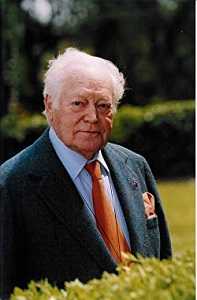
Maurice Druon (23 april 1918 – 14 april 2009)
Zie voor nog meer schrijvers van de 23e april ook mijn blog van 23 april 2018 en ook mijn blog van 23 april 2017 deel 2.

